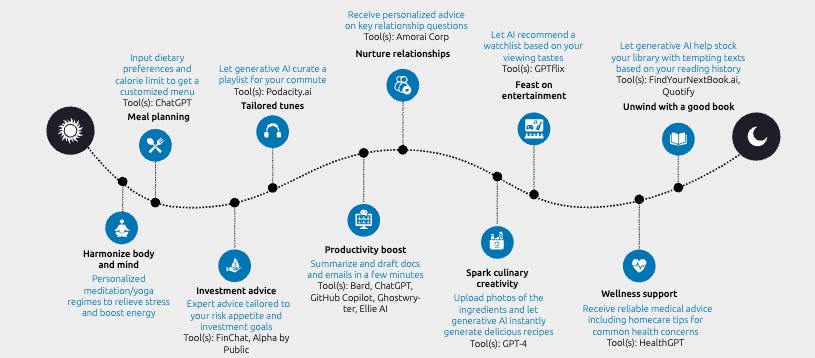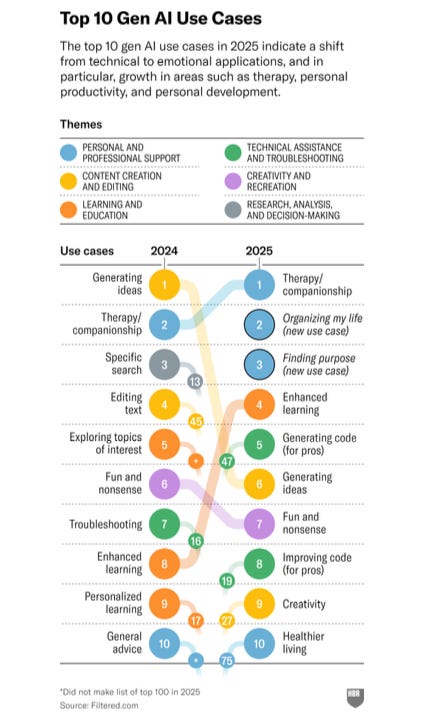Finding Your Purpose with GenAI
How people are using GenAI-tools in 2025.
The Intelligent Friend - The newsletter that explores how AI affects our daily life, with insights from scientific research.
In Italy, where I’m from, it’s common to spend summer evenings in company. Days can unfold in many ways. Some prefer to linger on the beach, perhaps planning the next trip. Others devote themselves to something creative or dive deeper into learning. The sea, and the beaches that line it, often become cradles of reflection — on how to be more organized, how to find a sense of purpose, or how to nurture relationships of any kind.
A line from an Italian director, Nanni Moretti, captures this feeling of connection with the sea perfectly: “Dear Diary, I’m only happy at sea” (translated). And yet summer days are not just about contemplation. Many keep working. Many spend more time with their children — entertaining them, telling them stories. In short, a “typical” summer day in Italy can vary widely, but the bella stagione sparks creativity and new ideas.
If you pictured a day like this on a beach in Campania — perhaps Capri — or in the mountains of Trentino, or even in cities like Rome, Padua, or Venice, that would be natural. But a similar day could just as easily be imagined in Washington, London, or Paris. Still, in making this mental translation, you’re probably leaving something out. In your picture, ChatGPT is missing. It feels hard to imagine reflecting on your life purpose while floating in the sea off Calabria, or telling your child a story in an American park, with the OpenAI app in your hand — doesn’t it?
Perhaps, as Marc Zao-Sanders reports in his recent Harvard Business Review article, not quite.
How People Are Using GenAI
Zao-Sanders is the author of a Harvard Business Review article, now in its second edition, titled “How People Are Really Using GenAI in 2025.” You’ll find in it the full detail of results, methodology, and further insights from his analysis. But what makes the piece fascinating is not only the data itself. It is the insights it reveals onto everyday behavior — and the many reflections it invites.
Often we focus on the macro-level implications of AI and GenAI, or on their broad effects at the individual level. Yet understanding how people actually use GenAI tools — for which purposes, in what contexts, and with what frequency — is not simply fascinating. It can also be deeply informative, and in many ways inspiring, for further study and inquiry.
If we return for a moment to our imagined Italian summer day, it is time to reveal that many of the activities I mentioned are among the top ten in Zao-Sanders’ ranking. For instance, learning, in the form of enhanced learning, comes in fourth. “Fun”, in its broadest sense, holds the sixth spot. And of course, creativity cannot be absent: it appears in ninth position.
There is also ample room for those who dedicate to reflection. Organizing life and finding purpose occupy the second and third places, respectively — surpassed only by therapy and companionship, which, according to HBR, is now the single most common use of GenAI. Look more closely, and you see many other activities take shape. Entertaining children, or creating personalized stories for them, fall within the top twenty-five. There are also other interesting activities:
Boosting confidence (18th);
Relationship advice (38th);
Getting past writer’s block (55th).
The article sketches a potential map of how GenAI is spreading into the rhythms of daily life. From this map, there are countless avenues of reflection. Let’s try to explore some implications.
GenAI tools are transversal among the use cases
Surveying the many use cases reported by Harvard Business Review, what strikes the eye is their sheer breadth. Indeed, they do not confine themselves to the workplace or to questions of productivity (as also confirmed by another interesting chart by Capgemini).

This breadth seems to invite attention. It suggests many new contexts for analyses and studies. Some studies already point to intriguing patterns: for instance, listeners often evaluate music more harshly if they know it was created with AI, and people tend to give themselves more credit when GenAI contributes to their work.
But what might this mean for parenthood, when bedtime stories are co-authored by a machine? And perhaps more importantly, how might this affect the way parents see themselves in those moments?
People use GenAI tools to find their purpose
People seem to be turning to GenAI for finding a sense of purpose. Whether this represents already a deeper trend is still not established, but the implications for identity and decision-making could be significant. There are many elements to consider.
Some evidence suggests that AI-human loops alter social and and emotional judgements. Therefore, how are people truly “challenging” the machine, and themselves, in order to discover a sense of purpose?
There is also the question of what follows from this search. To what extent might “finding purpose” lead to concrete actions, and if so, of what kind? Could organizations or institutions make use of an awareness of such shifts — or is it premature to think of it as structural change at all?
And finally, there are the implications for well-being. What happens when expectations set by GenAI are not met? And if these systems truly help users sharpen their focus, what exactly is being reshaped in turn in the process?
GenAI as a constant support
GenAI is increasingly a tool of support. People now turn to it not only for psychological help — as a “substitute” or “additional” therapist — but also for everyday forms of suggestions. They ask ChatGPT how to respond in delicate situations, or what advice to give in relationships. This can be genuinely helpful, both in facing difficult circumstances and in untangling everyday knots of doubt.
Yet alongside the benefits, risks must be acknowledged. According to recent research, among many risks it should be highlighted that the intense usage of GenaI-based tools may alter the fabric of social interaction itself, communication, and perceptions of other humans.
And you? Among the many use cases reported by Harvard Business Review, in which of them have you found yourself using ChatGPT or other GenAI tools?
See you in the next issue!
-Riccardo












Couldn’t not comment a piece that starts with the evocation of Nanni moretti !
A few comments
- yes definitely usage is broad
- will look at the cap Gemini study didn’t have this one in the radar
- but beware the data of the HBR piece is sourced from a data analysis of Reddit posts … probably not really representative of standard users. Still interesting as those would be the most tech oriented users but still
- anthropic has a good piece on what people do with Claude on their blog. And coding comes very high